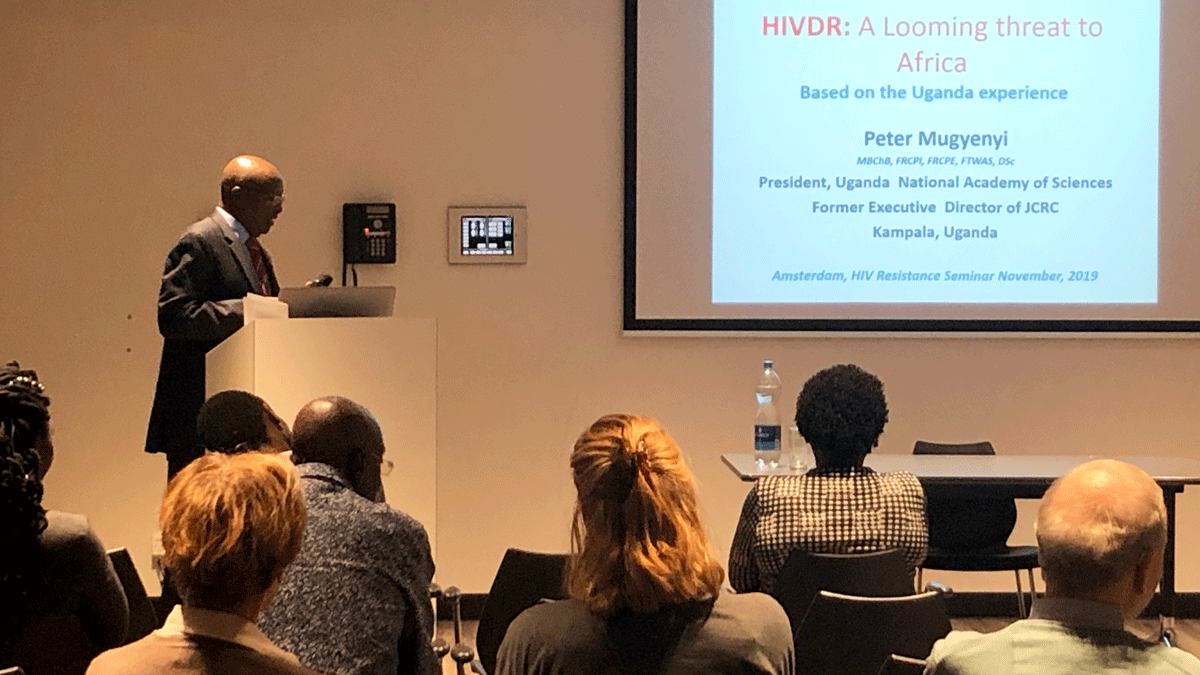
29 Nov Multidisciplinary, collaborative approach key to combating HIV epidemic and drug resistance
The commemoration of World AIDS Day, on 1 December 2019, is an important opportunity to recognize the essence of fighting HIV drug resistance through continued quality care at the community level. Find out more about how our work impacts HIV research, education and policy.
A visit to Amsterdam has come full circle for long-time AIGHD partner Prof. Peter Mugyenyi.
Prof. Mugyenyi visited Amsterdam from Uganda in November to serve as a promoter on the PhD defense committee for AIGHD PhD candidate Dr. Cissy Kityo. For years, Prof. Mugyenyi and the team at AIGHD have collaborated on impactful HIV drug resistance projects such as, PASER, MARCH, and ARTA. Cissy’s research was conducted as part of the PASER project.
Prof. Mugyenyi has a long history of HIV activism and research as a leading specialist in the field. He began as a pediatrician in Uganda before becoming Executive Director of the Joint Clinical Research Centre in Kampala. He serves as a board member for multiple institutions and organizations involved in HIV/AIDS and TB in Africa, the UK and the US. In addition to being widely respected for his achievements in HIV research and advocacy, he was also one of the first pioneers to introduce antiretroviral drugs in Africa, bringing them to rural areas and saving countless lives.
“Peter, in my view, is the Joep Lange of East Africa. He has set examples and worked tirelessly on combating HIV and was one of the first to identify HIV drug resistance. His research and advocacy have paved the way for improved access to HIV care and treatment not just in Africa, but around the world,” said AIGHD Prof. Tobias Rinke de Wit, principal investigator and promotor, who organized the HIV drug resistance symposium held the day before Dr. Kityo’s defense.
HIV drug resistance is on the rise in Africa. According to the WHO, it impacts now twice as many women than men and nearly half of all babies born with HIV will develop HIV drug resistance before their second birthday. It is exactly for these reasons Prof. Mugyenyi says more work is needed in this field: “When you are pioneering HIV treatment and scale up to large numbers of patients on treatment, it is imperative that resistance is addressed vigorously to minimize its emergence, so that the program saving millions of lives remains viable and effective”.
“We have to realize that last year still 1.7 million people got infected with HIV and 0.7 million people died. This is equal to the worst Ebola outbreak of 2016, but then every week. HIV will be there for the full 21st century and every year there will be an additional 1 million people living with HIV. They need sustainable access to quality healthcare and if not, many will develop resistance and contribute to a new epidemic that can be more dangerous and costly. We cannot sit back and consider HIV done,” added Prof. Rinke de Wit.
There are a number of ways to help combat the epidemic, including ensuring access to treatment for those in rural areas and advocating for countries and donors to continue investing are key to ending the epidemic, added Prof. Mugyenyi. In addition, collaborations and multidisciplinary projects, like PASER, are the way forward.
“When you collaborate, you get various expertise and increase chances of resources which are necessary to work on a complex problem. The epidemic is still raging out of control and partnerships such as with AIGHD are crucial.”
